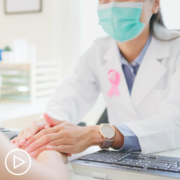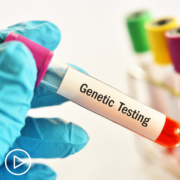Considerations That Help Guide Breast Cancer Treatment Decisions
Considerations That Help Guide Breast Cancer Treatment Decisions from Patient Empowerment Network on Vimeo.
What are key factors that help guide breast cancer treatment decisions? Expert Dr. Bhuvaneswari Ramaswamy explains what is considered and explains the significance of each factor.
Dr. Bhuvaneswari Ramaswamy is the Section Chief of Breast Medical Oncology and the Director of the Medical Oncology Fellowship Program in Breast Cancer at The Ohio State College of Medicine. Learn more about this expert here.
See More from Thrive Breast Cancer
Related Resources:

|

|

|
Transcript:
Katherine:
Another key component of thriving is finding a treatment that is right for your disease. What are the considerations that guide a treatment decision?
Dr. Waks:
Yeah, great question. So, what we just talked about, the two things that are very important for us to make a decision, and that’s where we have come far in the last 20, 25 years, is because we are not just taking the staging.
That is anatomical staging, meaning what’s the size of your tumor and the lymph node involvement. We use those. That is important for us because that obviously changes the risk. The higher the stage, the higher risk of recurrence. The higher the risk, we have to do more treatment to get a benefit, right? So, that’s one side. But what we have come to understand is biomarkers are very important. That is biology of your tumor.
So, the grade, how quickly it’s proliferating although it’s not a biomarker, but it tells us a lot. And then the three important biomarkers we talked about ER, PR, and HER2. Those all are important for us to make a decision. In addition to that, we do something called a genomic testing called Oncotype DX assay. There is also another test called MammaPrint. These are genomic testing.
That is, we look at some of the genes that are up or downregulated in your tumor to decide whether you are going to benefit for something called chemotherapy or maybe just targeted therapies enough. So, these are some of the factors that we use to make a decision.
Now, do we use age and your performance status? Meaning how well you are? Do you have comorbidities? Do you have bad diabetes? Do you have heart disease? Yes, they all go into that whole treatment decision, but the primary is made out of biomarkers and genomic testing and anatomic, and the rest are additional factors that go into our decision-making.
Katherine:
Yeah. What about metastatic disease? Are the considerations different when it comes to treatment?
Dr. Ramaswamy:
It is a little bit different because the first thing that we have to understand is when we are seeing them in stage I, stage II, stage III, which is stage IV is metastatic, stage II – we – our goal is a curator. We are trying to really throw the kitchen sink, although that’s really not what we do. We are trying to still be tailored therapy, but we are trying to do everything we can to prevent a recurrence.
But now when you have a stage IV disease that is the cancer has spread, that is the horses have left the barn in the breast and has gone and settled in distant organs and gone, our goal is to try to contain the disease. So, prevent further progression, prolong the life and survival, and also improve quality of life. So, there are those consideration.
The biomarkers still go into consideration. We ensure we biopsy the metastatic site and look for those biomarkers. We do the genomic testing, gene sequencing of this. That will also help with our decision-making. We, of course, look for clinical trials because new novel therapies are always more important, but these are the other factors. And, of course, performance status that is how well you are, how well your organs are functioning, and what’s your age, and how that affects your morbidity. All of those are also important.






